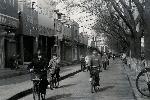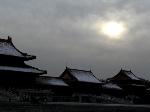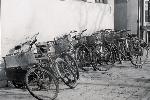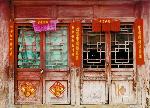- Getting around Lijiang. Dont stay in the Old Towns more than 2 days, there is nothing to do. KRISS Oct 9, 2013 05:46
- 2013 Beijing Temple Fair BENNYLAU Feb 26, 2013 03:29
- Malaysian traveling from KUL - LAX vis Shanghai PVG ZATI_DY Jan 3, 2013 20:15
Beijing during the Spring Festival -- Part I
- Views: 4023
- |Vote: 1 0
- |Add to Favorites
- |Recommend to Friends
Impressions of Beijing
We visited Beijing as the Spring Festival peaked, yet the cold of winter loomed and swirled around us. The Spring Festival is fifteen days long and is set off by the Lunar New Year, but for many, the holiday includes the two weeks before, so that they can return to their hometowns across China. During the Spring Festival, about 40% of Beijing’s population disperses to their hometowns, leaving the city feeling more spacious than usual. A mad rush of street, rail, and highway transportation works overtime to send people home, and leaves many scrambling for tickets. Then, on New Year’s Eve, a silence and peace falls over the city's streets. Most businesses close – and the nation takes a well-deserved rest to renew its family ties.
As we entered Beijing a few days before Lunar New Year, the farms and fields we passed by were gradually being claimed by encroaching civlization. The northern sky swept by in soft gray puffs with linings of silver, and cast a mild winter sun on the ochre landscape below. Beijing is geographically flat, but is actually situated in a depression in the ground like a large shallow bowl. This geographic formation makes the city very hot in the summertime, and sometimes very cold in the winter as well.
The city has for many years kept a low, beautiful skyline that is harmonious with its ethos as the jewel in China’s continuous 5,000 years of history. Currently, the face of the city is changing rapidly from its classic beauty to a more schizophrenic appearance after the introduction of some bizarre modern architecture. During my visit, I was glad to see the Forbidden City, Tiananmen Square and its adjoining temples are still framed by a beautiful sky and its changing moods. This visual link between the palaces and the sky is a subtle reminder to people of the traditional relationship between the government and its source of legitimacy.
There was a philosophy on governance, the Mandate of Heaven, that first appeared in China about three thousand years ago. This idea was advanced for its time since it legitimized the emperor’s rule, through his wisdom, virtue, and talent. He might have gained his position by birth but had to keep it by demonstrating his just and virtuous leadership of the nation. While Europe struggled with the problems of Divine Right (rulers whose position was not dependent on performance and could not be legally replaced), China in its early days had already sown the seeds of a republic. If the emperor ruled unjustly, then his people could replace him by a successful revolt. This idea of aristocracy "by merit" influenced the French educational system and was even embraced by Thomas Jefferson when he planned his republic of America.
If These Stones Could Speak
The day before the Lunar Year, we decided to make a pilgrimage to the Great Wall. As a child, the moment I saw a photo of Simatai’s highest watchtower in National Geographic, it struck me as a place that I must visit. And now, after 30 years of waiting, I could not be more excited to have my chance to see these remnants of the project, that in its early days engaged 70% of China’s population.
What would the Great Wall’s stones say if they could speak? I thought that they would speak of the bygone kings who gave birth to the Wall and the soldiers who defended them. But unheard of are the stories of the nameless, hundreds of thousands who toiled as slaves and had the fate of having several generations born into not knowing any other life than building the wall. Some were peasants and many were political prisoners. Their lives, their families, their blood, sweat, and tears are a big part of the story of the Great Wall.
The Wall was originally built to protect the Chinese nation from marauding nomadic horsemen of the north, the XiongNu, who terrorized farmers out of necessity since their own soil was barren. Centuries later, it defended China against the Mongols and the Manchus, but these endeavours failed in the end. The Mongols, led by Khubilai Khan, ruled China for nearly a century before they were ousted. Then, the first emperor of the Ming Dynasty (1368-1644) launched the most ambitious building and reconstruction of the Great Wall ever seen. The walls from Hebei to Gansu province were built during this era, including the now crumbling, atmospheric section of the wall from Jinshanling to Simatai. The 10.5 km hike is slightly perilous and absolutely marvellous -- this section has 30 architecturally different watchtowers -- which make it well worth the journey there.
Getting to Jinshanling Great Wall
To get to the Great Wall from downtown Beijing, we transferred between two buses, the final one was destined for Miyun, a suburb on the northeast perimeter. We finally arrived at Miyun bus station after two hours and walked to the edge of a field, where a line of taxi drivers was waiting. I negotiated a 120 RMB fare for the trip to Jinshanling. It was not an ideal price, but I didn’t haggle considering that day was a holiday. I sat in the co-pilot’s seat, while Bradley and David sat in the back. Later on, they complained about the exhaust fumes that were funneled into the back through rusty holes in the old van. I kept my window open, preferring to be cold than get sick from fumes.
We drove away from the city and as we got progressively farther, ascended from the basin in which Beijing lies, to higher ground. Lying with their awesome spines against the sky, the hills looked like bovine herds at rest. The countryside was dotted with little houses and settlements, but was for the most part uninhabited. I felt as if I had stepped into a painting by the Old Master Rembrandt, who using only brown and ochre tones, portrayed the days gone by with great refinement.
Snow glazed the ground on random boulders and patches of soil. The road now curved alongside a hill, and to our left, a large river that had followed us for miles flowed into a long reservoir. Powerful river fish, looking uncomfortably numb, dangled from trees as handwritten Chinese signs alongside touted their prices. For some moments, I felt a loneliness, since most Chinese people here were with their families, but I was 8000km from my family, and just a stranger heading into a strange land.
At the Jinshanling Trailhead
When we arrived at Jinshanling, Bradley and David stumbled out of the car like two drunks. They both professed pounding headaches from the exhaust fumes in the car and wanted a different taxi driver for the return trip, but the entire parking lot was empty. We would be lucky just to get a ride home!! I was looking forward to have a hot bath that night, and made sure I would be able to do that!
New Year’s Eve is not the best time to climb the Great Wall because there are no vendors in the area. When the food and souvenir touts are around, people think they’re annoying. But when they’re not around, there’s nowhere else you can get food or water or a ride home. I don’t eat tree bark or wild animals, so I was pretty grumpy by late afternoon. We started hiking at Jinshanling around 2:00pm and had to move at a steady pace in order to get to Simatai by nightfall. As a veteran hiker, I can tell you that after dark what was a pleasant hike during the daytime can become a lot less fun and a lot more dangerous.
Along the trail, we saw a charming but empty wooden house with calligraphy and window cuttings with lucky sayings in the New Year custom. The area was so deserted, I could hear the wind whistling in the grasses. So I was really happy when, when suddenly children appeared out of a side road and started pestering us. They were cute, poor, and infinitely hopeful of making a sale. “Hi! How are you? Postards? Good price! Book? Good price!” I bought both postcards and a guide book, but my friends only scowled at me in disgust. They wanted me to be like the Great Wall – iimplacable -- and put up a united front with them against the barbarian touts who persistently targeted our renminbi.










 Copyright © 1998-2026 All rights reserved.
Copyright © 1998-2026 All rights reserved.
1.
Dec 10, 2007 02:34 Reply
LEMONCACTUS said:
A thought-provoking review, thanks